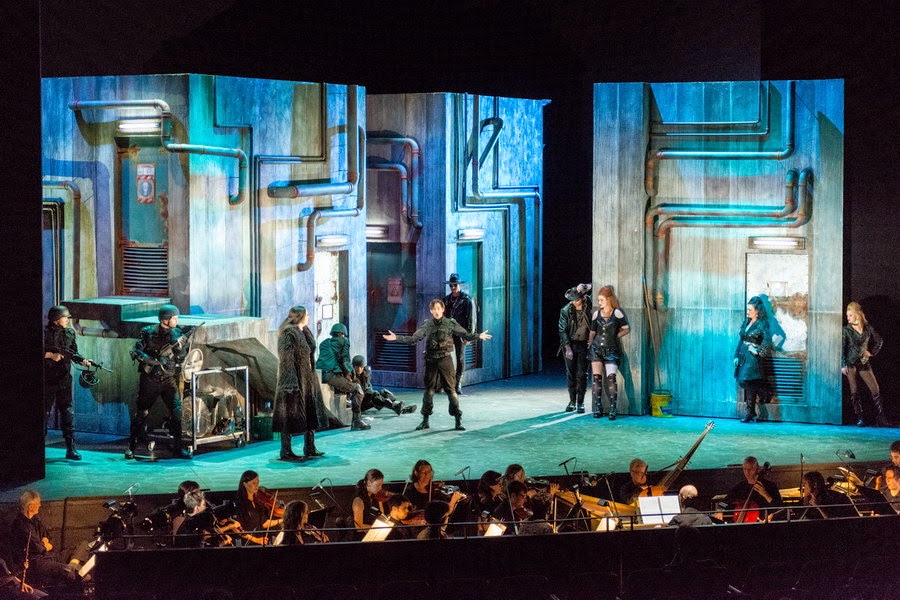 |
| Jennifer Rivera and cast |
Curran draws a level of detailed acting from the seven soloists and twelve actors not often enough seen on the opera stage and floods the performance with pulsating scenic shifts propelled by countless entrances and exits. Occasional rises and falls of the magnificent stage scrim, depicting an 18th painterly image of a fallen deer being mauled by a pack of wild dogs, added to the spatial diversity.
No stand and deliver drudgery interrupted either the intricately crafted chaos on stage or the embedded incidental comedy, evident from the moment conductor Erin Helyard set the lengthy overture to a smooth tempo from the pit. Experiencing Curran's Faramondo was akin to the voyeuristic pleasure of being intrigued by that which isn't easily understood yet impossible to look away from.
Not even several attempts I made to work through the synopsis on paper was enough to feel knowingly secure where I was up to. As the actual story on stage twisted its way towards its jubilant ending of virtue over hatred and eyes spy the English translation above, the detailed richness proved the best approach to the work.
 |
| Anna Starushkevych and Jennifer Rivera |
As Gustavo, the distinguished mafia-looking leader of the Cimbrians, bass-baritone Wayne Tigges added confidence and striking, steely polish to a performance which appeared apprehensive and struggling for vocal weight at the start.
Christopher Lowrey simply shone in the role of Gernando, the Swabian leader portrayed as an androgynous-looking, long-haired goth, whose violent leadership and scrumptiously humorous panty fetish completely matched his colourful countertenor. Lowrey's focused performance, vocal fusion with the orchestra and perfectly controlled legato elicited superbly elegant shading throughout and he clearly revelled in the chance to go for the audience's jugular with remarkable power in an Act III aria as he sniffs, then masks himself in pantyhose.
Anna Devin was both poised and alluring as Faramondo's sister Clotilde, demonstrating sustained vocal vigour accompanied by a bright tone and lightly gravelly appeal where every breath drawn added further characterful beauty.
Tai Oney provided further deft countertenor treats as Gustavo's impetuous son Adolfo, in mutual love with Clotilde and perilously pushed in his relationship to his father. Vocally warm and velvety, Oney added a silvery edge to his sound as he pinched every note from the orchestra to achieve glorious harmony, one he equally realised with Devin in Act III's duet in the ravaged casino in which a haunting beauty and heaving sensuality resulted while the pair sang from under hoods. Only in recitative did Oney expose a hint of vulnerability.
 |
| Cast members, Faramondo |
Conductor Erin Helyard intimately drew together his musicians of the Orchestra of the Antipodes and on-stage soloists to build an invigorating performance in his engaging, energetic way. A few stray notes escaped from the pit and the first act moved a tad mechanically but as the time passed, so did the intensity of playing and the depth of sound-colour achieved.
Trying to keep track of Faramondo in only one sitting is a big ask and the work's relevance in a fully staged version might very well wear thin. Conversely, I felt a great privilege witnessing what struck me as the most ostentatious, skilfully acted concert performance ever staged, entertained and engrossed by Handel's beautifully structured music but the likelihood of never seeing it fully staged again.
Production photos by Darren Thomas
No comments:
Post a Comment